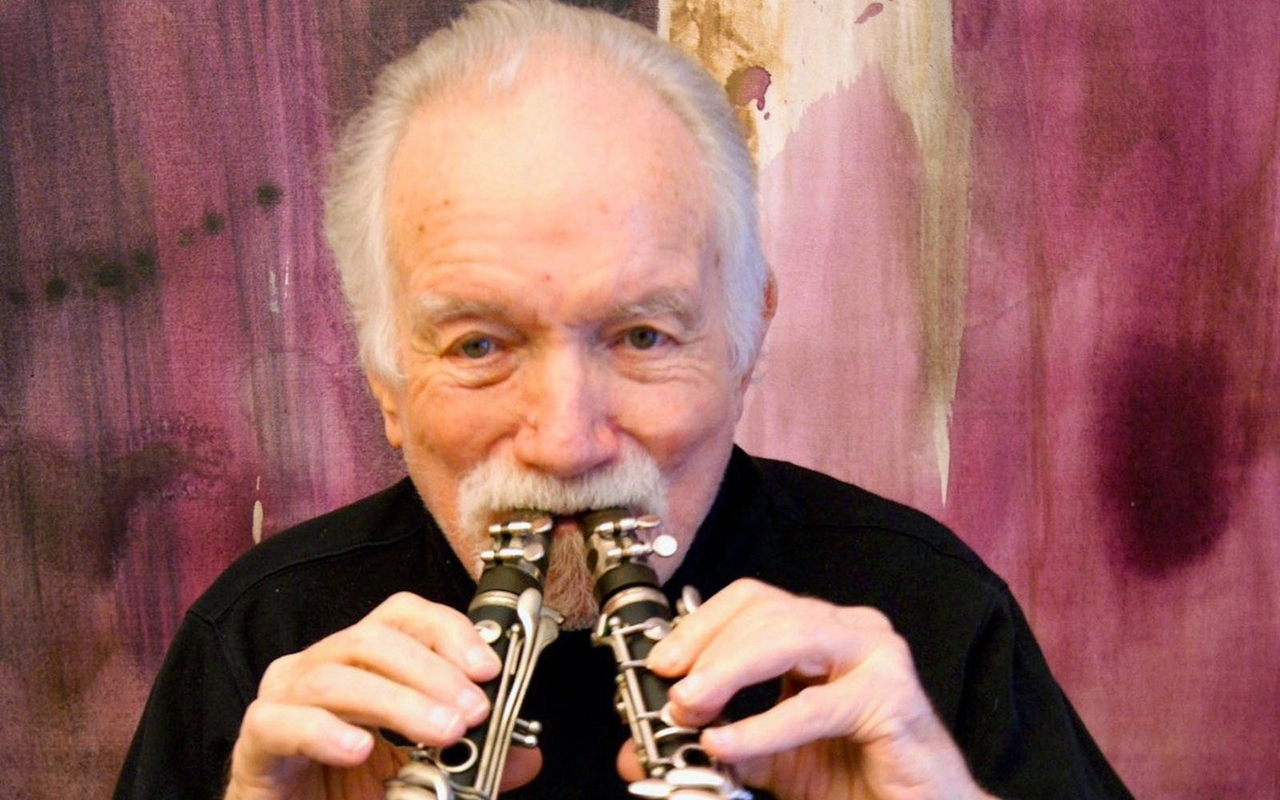
William O. “Bill” Smith
William “Bill” Smith photo by Virginia Paquette Smith.
Bill Smith, a distinguished clarinetist and composer in both jazz and new music, died on February 29 from complications of prostate cancer. He was 93.
Bill made so much music that he had two personas. As William O. Smith, he was an acclaimed innovator in “new music” who pioneered the use of many untapped sounds of the clarinet.
In jazz, he was just as renowned, primarily for his long association with Dave Brubeck.
Their friendship went way back. When Smith attended Juilliard School of Music in 1945, at age 18, a regular Manhattan gig enabled him to wander among jazz clubs hearing the likes of Charlie Parker, Billie Holiday, and Coleman Hawkins. But Bill disliked Juilliard’s approach to clarinet and composition, so he returned to California to study with eminent modernist Darius Milhaud at Mills College in Smith’s hometown, Oakland. Dave Brubeck enrolled there, too, and he and Smith became lifelong friends and collaborators.
Smith was an original member of the Brubeck octet, which began working the Bay Area in 1947 and evolved into Brubeck’s highly successful quartets and other combos.
Smith played on and wrote for the Octet’s first recordings in the late 1940s and early 1950s. Around 1960, he and Brubeck recorded three albums of Smith originals: The Riddle, Near-Myth, and Brubeck à la Mode.
Bill moved to Seattle in 1966, and for over 30 years taught at the University of Washington while co-directing with trombonist Stuart Dempster the UW’s Contemporary Group.
Academe did not make Smith stuffy, nor anything near it. Smith’s work was frequently arresting—as in his many pieces for two clarinets played simultaneously, in emulation of the ancient Greek aulos—and often humorous, as in a 1981 work for horn and voice that bids any audience to provide a drone note “ideally in F.”
Bill rejoined the Brubeck Quartet in 1982, and for some years recorded and played up to 100 gigs a year while continuing to teach.
He had equal standing in jazz and new music. New-music critic Eric Salzman wrote in 1964 after hearing Bill perform one of his clarinet pieces, with an array of technical innovations amid “pure whistling harmonies; tremolo growls and burbles; ghosts of tones,” and much else: “Completely impossible except that it happened.”
In jazz, Bill was a pioneer of what came to be known as “Third Stream,” merging jazz and classical music. In a 1986 interview, Dave Brubeck said: “Bill Smith, I still think, is one of the most important jazz players. He opened up all kinds of new fields, electronically, way before anybody else.”
In a just-published biography, Dave Brubeck: A Life in Time, Philip Clark refers to Smith as the “fifth Beatle” of the “classic” Brubeck quartet, and acclaims Smith’s clarinet tone for having “no trace of the swing-era sweetness of Artie Shaw or Benny Goodman” but instead “relentlessly inventive notes, projected with an attractively shrill tone, as if he were dispatching urgent news.”
In 2008 Smith fulfilled a long-time goal by creating a “jazzopera,” Space in the Heart, and performing it at the 2008 Earshot Jazz Festival and in 2010 at Symphony Space in New York with the Pocket Opera Players, the company of pianist and prominent composer of microtonal music, John Eaton. Furthering new music experimentation, in the mid 1960s, Eaton and Bill collaborated on developing uses for Paul Ketoff’s SynKet, an early music synthesizer.
Until very late in life, Bill traveled often to Italy to play with colleagues there, as he had since winning the prestigious Rome Prize for composition in 1957.
He is survived by his wife of 42 years, Seattle visual artist Virginia Paquette Smith, four children from a first marriage, three grandchildren, and generations of friends in music in Seattle and far afield.
His family is planning a memorial concert for what would have been Bill’s 94th birthday, on 22 September 2020, and ask that remembrances be sent to the International Clarinet Association (clarinet.org), “In Memory of William O. Smith.”
–Peter Monaghan